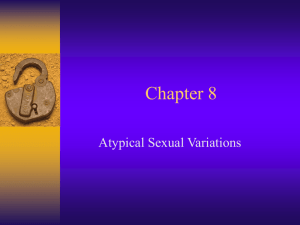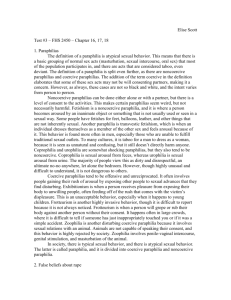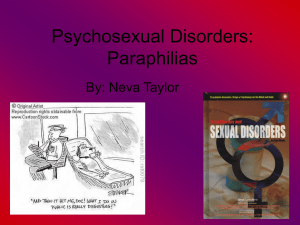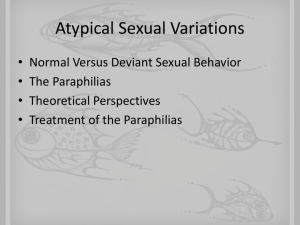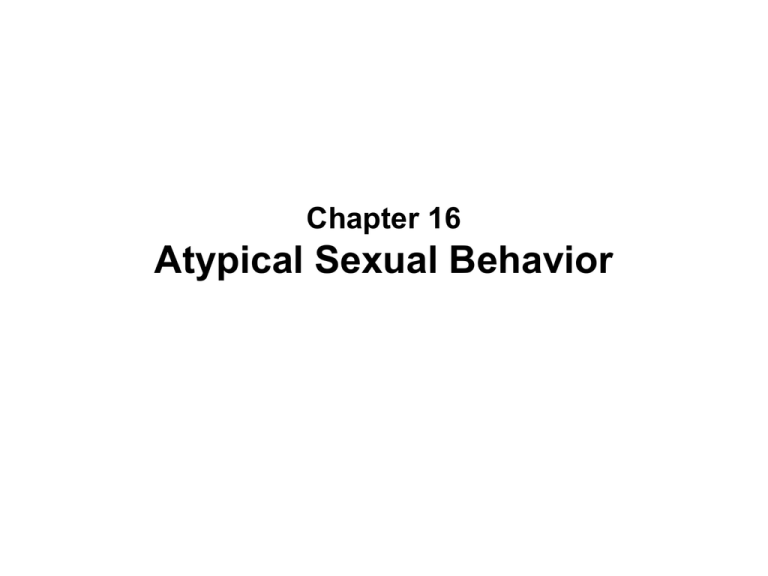
Chapter 16
Atypical Sexual Behavior
History of “Normal/Abnormal” Behavior
• By the mid 11th century, Christian leaders began to
regard sex in any position other than the “missionary”
position an unnatural act.
• Victorians were influenced by Hippocrates’ (of ancient
Greece) “seminal theory” that regarded semen as the
essence of life. It was believed that each sperm
contained a tiny human; the role of the woman’s ova was
unknown and the womb of woman was viewed merely as
an incubator for new life.
History of “Normal/Abnormal” Behavior
• Further, semen was believed to contain cells that caused
male maturation. Frequent sex (including masturbation)
was thought to deplete the man of these critical cells,
stunting his growth. Masturbation = self-abuse.
• Freud (a Victorian Era fellow) taught that any sexual
behavior that took precedence over heterosexual vaginal
intercourse was immature and possibly a sign of serious
psychological disturbance.
Current Perspective
• Simon (1994) views “deviance” as a problem of selfcontrol, and “perversion” as a problem of desire. Both
violate current cultural norms.
• When psychologists diagnose a person as having a
sexual mental health problem, the term “paraphilia” is
used.
Paraphilias
• Paraphilias are sexual behaviors that involve a
craving for an erotic object that is “unusual.”
– This behavior causes significant distress and
interferes with a person’s ability to work, interact with
friends, and other important areas.
– To be diagnosed with a paraphilia, a person must
experience symptoms for six months or more.
Paraphilias
• Not all unusual behaviors will be diagnosed as
paraphilic; the distinguishing feature of a paraphilia is
that the person’s sexual arousal and gratification
depends almost exclusively on acting or fantasizing
about the behavior.
• In nearly all cases, the paraphilia will either cause or
reveal harm done to the individual or to others, and there
is generally an obsessive-compulsive quality to the
behavior/fantasy.
What Constitutes Paraphilia?
•
•
•
•
Classified as noncoercive vs. coercive
Behaviors represent extremes on a continuum
More males reported and prosecuted
Over half of individuals in treatment for a paraphilia report
that they had engaged in 3 or 4 types of paraphilias.
• Clustering of paraphilias
• Most had developed their fantasies by age 12 or 13 but
had been afraid to discuss them.
• Unconventional behavior may alienate others leading to
difficulty in establishing relationships
Theories of Paraphilias
• Biological Theories – differences in brain chemistry or
brain damage.
• Freudian theorists – arrested psychosexual development
early in childhood; castration anxiety; defense
mechanisms develop to reduce anxiety.
• Learning theorists – classical conditioning (association of
an object with sexual arousal) or operant conditioning
(early unusual sexual experiences are reinforced by
orgasm).
• Paraphilias and obsessive-compulsive disorder have
many similarities.
Why Men?
• Attitudes about and expectations of men and women are
different; consider women “flashing” or cross-dressing.
• Most paraphiliacs are heterosexual, but generally have
poor social skills, low self-esteem, history of childhood
abuse or neglect (or were raised in families where sex
was thought to be evil and normal erotic development
was inhibited), and anger at women.
Non-Coercive Paraphilias
Fetishism
• Sexual arousal primarily from body part or inanimate
object
• Symbolic transformation
• Rarely harmful to others
Non-Coercive Paraphilias
Transvestic Fetishism
• Sexual arousal from wearing clothes of other sex.
• The purpose is sexual arousal and gratification.
• The large majority of transvestites are heterosexual and
most are married. (As a diagnostic category, term is
applied only to heterosexual men.)
• Reasons vary and may include – Escape from the confines of the masculine role
– Finding comfort in the fantasy of being female
– Reaction to being punished as a child by being made to dress as
a girl; or being encouraged to dress as a girl.
• Rarely harmful to others
Non-Coercive Paraphilias
Sexual Sadism and Sexual Masochism
• Sadism: sexual arousal from giving physical or
psychological pain
• Masochism: sexual arousal from receiving pain /
bondage
• Difficult to label because some behaviors common
– Being tied up, or “pinned down,” “love bites,” etc.
• Level of pain needed for arousal varies from symbolic to
mild pain to (rarely) severe pain
• SM activities often include bondage and “discipline,”
motivated by a desire to experience dominance and/or
submission rather than pain.
• Might provide escape from rigid everyday lives
Other Non-Coercive Paraphilias
• Klismaphilia: receiving enemas
• Coprophilia: contact with feces
• Urophilia: contact with urine (“golden showers”)
Other Non-Coercive Paraphilias
• Autoerotic asphyxia: reducing blood supply to
the brain during heightened sexual arousal
–
–
–
–
–
Unfortunately 500 – 1000 deaths occur annually.
Rare but life-threatening
Almost exclusively male
Pressure via chain, belt, rope noose
Alone or in groups
Coercive Paraphilias
Exhibitionism
• Exposing genitals to an involuntary observer.
• “Streaking” or “mooning” represent playful deviance.
Doing a strip-tease for your lover is a normal variant.
• Sexual arousal from the fearful, angry or surprised
response is their preferred means of gratification.
• Often immediately followed by masturbation centering on
victim’s shocked reaction
• Most flasher victims are women and children.
• Suggested response
– Calmly ignore it
– Leave immediately
– Report to authorities ASAP
Who are Exhibitionists?
• Almost all are men (nobody is scared when a
woman shows her genitals) who began exposing
themselves in their late teens or early 20s; half
or more have been or are married.
• They are emotionally immature, feel inadequate,
fear rejection and have trouble forming intimate
relationships.
• Most are have normal or above normal
intelligence.
Coercive Paraphilias
Obscene Phone Calls
• Making an obscene phone call is a verbal form of
exhibitionism; like exhibitionism, it is a disorder of
relationships.
• Sexual arousal is proportionate with the victim’s negative
reaction. Even slamming down the phone is reinforcing
to him.
• It is rare that they would approach or molest their
victims; most prefer total anonymity.
• Usually a shy, insecure male
• Suggested response
– Gently hang up, ignore re-call
– Screen calls, call tracing
– Report and ask for new number
Coercive Paraphilias
Voyeurism
• Watching others do sexual things is a normal sexual
variant.
• Voyeurs seek to observe people without their consent or
knowledge and find this to be their preferred form of
sexual arousal and gratification even if consenting
sexual partners are available.
• Most begin by age 15, have low self-esteem, feelings of
inadequacy, poor social skills.
• More likely to observe strangers than acquaintances
Other Coercive Paraphilias
• Frotteurism: rubbing against unwilling victim
–
–
–
–
–
Fairly common
Unwelcome “spooning” in public places
Sometimes hands
Often unnoticed
Occasionally detected and upsetting
• Zoophilia: sex with animals
– Kinsey – 8% of males!! (17% of farmboys)
– 4% of females!!!
• Necrophilia: viewing or having intercourse
with corpse
Therapy
• The large majority of paraphiliacs do not want to change,
stifling hopes of success in therapy.
• Traditional psychotherapy or group therapy aim to
increase the individual’s awareness of his feelings, while
confrontational approaches are sometimes used to force
the individual to see the effects his behavior has on
others.
• Behavioral approaches include aversion therapy and
orgasmic reconditioning.
Therapy
• Desensitization is employed to help the individual
overcome his anxieties.
• Social skills training teaches skills not learned in
adolescence.
• Medical approaches to reduce sex drive have been
used, as well as anti-anxiety and anti-depressant drugs.
• Medications must be used in conjunction with other
methods so as to address the complex nature of
paraphilias.

